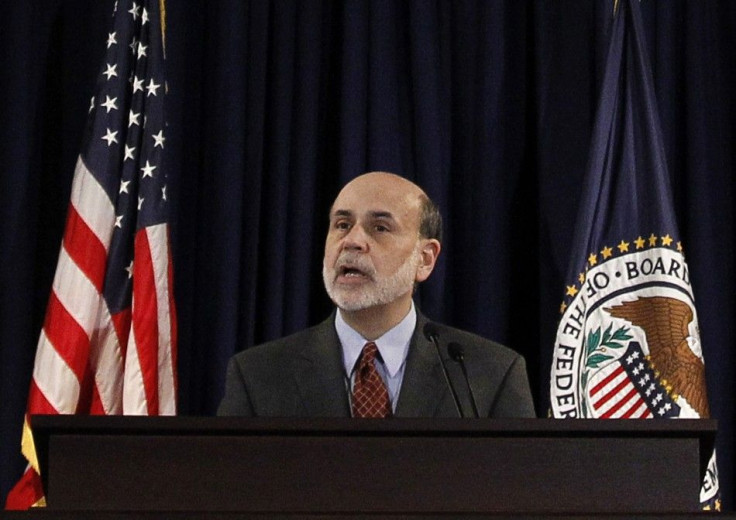Some at Fed Eye Gas Pedal, Others the Brake

(Reuters) - Federal Reserve policymakers are turning to cars to illustrate just how split they are over what, if anything, to do about the U.S. economy, with some eying the brake pedal and others the gas.
Philadelphia Fed President Charles Plosser on Tuesday decried the accelerationist approach to monetary policy among some of his colleagues, pointing to signs of economic improvement as reason enough for the U.S. central bank to stand pat on rates for now.
The comments, which step up Plosser's longstanding opposition to the Fed's ultra-easy policies, came less than a day after San Francisco Fed President John Williams said it is vital that we keep the monetary policy throttle wide open to reduce unemployment and bring inflation back up to more desirable levels.
Dennis Lockhart of the Atlanta Fed was right in the middle, saying he believed the central bank's current policy stance is appropriate given an economy that is recovering but still shows signs of weakness.
Williams' stance is shared by the more dovish core of the 17 current policymakers at the Fed, which is stretched thin after battling the brutal U.S. recession and financial crisis.
Williams and Lockhart are voting members on the Fed's policy-setting committee this year, while Plosser is not.
The mixed messages can confuse investors, underscoring the difficulty Fed Chairman Ben Bernanke faces in assuring markets the Fed is committed to supporting the economy for as long as it takes, even while some policymakers disagree on how long that will be.
I'm not anxious to step on the brake, but I'm not anxious to cut a hole in the floorboard so I can go faster either, Plosser told reporters, adding the Fed must be prepared to tighten monetary policy if needed.
I think that economic conditions, as they have evolved since late last year, do not call for further accommodation, Plosser earlier told a University of Delaware audience. In fact, the economy has actually improved.
DELICATE RECOVERY
Central bank policymakers are increasingly split about how to handle a delicate economic recovery that has gained traction in the last few months, including surprising drops in the still-high unemployment rate.
Daily economic data remain somewhat mixed, underscored on Tuesday when January retail sales came in lower than expected as consumers cut back on car purchases, while a rebound in an underlying sales gauge suggested a solid underpinning for the U.S. recovery.
The recent economic news has been encouraging, but in my view we haven't seen enough sustained improvement to be sure it will last, Lockhart said at an event in Sarasota, Florida. I think the current policy stance is appropriate for an outlook of steady, moderate growth with gradual employment gains.
Last month, the Fed sketched a difficult road to a full recovery and Bernanke left the door open to more large-scale asset purchases if U.S. unemployment remained high and inflation eased.
The central bank completed two such quantitative easing programs since 2009 in which it bought a combined $2.3 trillion in long-term securities. The purchases, as well as near-zero interest rates since late 2008, were meant to encourage borrowing, investment and U.S. growth.
Plosser is among a minority of top Fed officials who opposed a policy statement last month that said the Fed expected to keep rates exceptionally low at least through late 2014.
He and others have highlighted data that have since shown a pick-up in the manufacturing and service sectors, and a drop in the unemployment rate to 8.3 percent in January, from 8.5 percent in December and 8.9 percent in October.
Plosser said the employment gains since October are a clear positive trend.
AROUND THE BEND
Some other Fed policymakers, including Richmond Fed President Jeffrey Lacker and Williams last week, have said the recent job market rebound dampens prospects for more stimulus measures.
Plosser, among the most vocal of policy hawks, said the accelerationist approach to policy dangerously sets up the economy for either a nasty bout of inflation or an abrupt distortion of financial markets and misallocation of resources.
U.S. stocks slipped after the retail sales data, while prices for government debt gained. The dollar, which has been pressured by the Fed's huge bond-buying programs, rose against the euro on Tuesday.
More policy easing actions would lead us down a very treacherous path - one that would be ever more difficult to navigate and one that would increase the already substantial risk of higher inflation, Plosser said.
He also said that the United States, the world's largest economy, is in a modest recovery at the moment, adding he expects inflation to settle this year around 2 percent, which is the Fed's formal price target.
--
© Copyright Thomson Reuters 2024. All rights reserved.




















